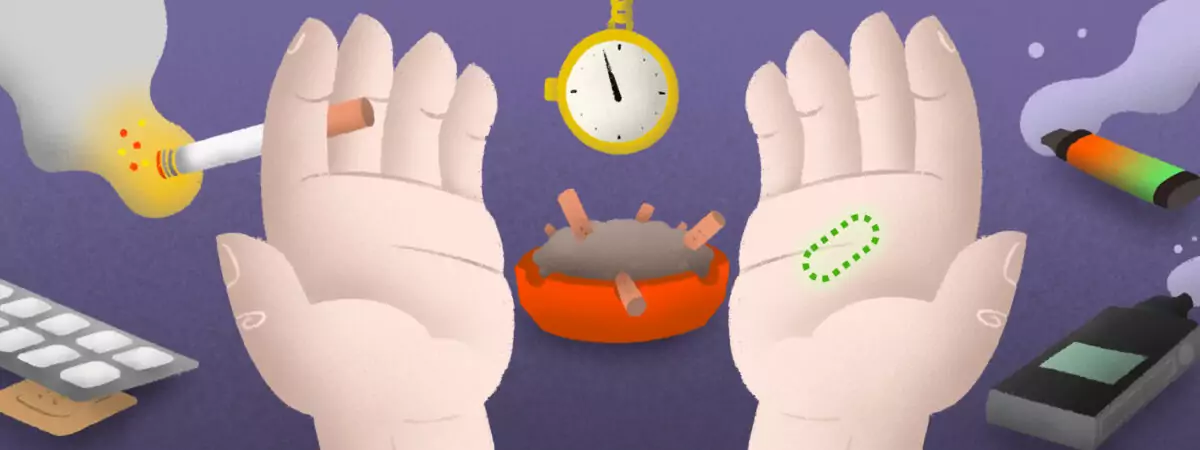Tobacco cigarette smoking is the leading preventable cause of death worldwide, yet no new smoking cessation medicines have entered the UK market for nearly two decades[1]. Not only is there a lack of new treatments, but two effective medicines have recently vanished from pharmacy shelves. Varenicline (Champix; Pfizer) disappeared from the market in 2021 and bupropion (Zyban; GSK) followed in December 2022, leaving nicotine replacement therapy (NRT) as the only available pharmacological option[2,3].
With the UK government’s objective of being ‘smoke free’ by 2030[4], new treatments are desperately needed, particularly amid the government’s drive to expand smoking cessations services through community pharmacies (see Box). Published in July 2023, trial data on cytisine — a medicine that has been used as a smoking cessation aid in Central and Eastern Europe since the 1960s — have given experts hope that a new treatment for UK patients could finally be on the horizon[5].
Box: NHS smoking cessation service
In March 2022, NHS England commissioned community pharmacies to provide the ‘NHS smoking cessation service’ as an advanced service, with the aim of improving access to smoking cessation aids in primary care[6].
The service allows referral from secondary care into community pharmacy for continued treatment and support for patients attempting to quit smoking once discharged. As of August 2023, more than 4,200 community pharmacies have registered for the NHS smoking cessation service.
An expansion to the service is being piloted in Nottingham in which women trying to conceive, as well as pregnant women and their families, can be referred by the local hospital and members of the primary care team to community pharmacies for evidence-based smoking cessation support for 12 weeks, including a follow-up service. A further expansion is piloting referrals for patients who have been screened for lung cancer.
Pharmacies providing the smoking cessation service receive a set-up fee of £1,000. They will also receive £30 for a patient’s first consultation, £10 for interim consultations and a final fee of £40 for a patient’s final consultation.
Cytisine, a nicotinic receptor partial agonist, could be the “aspirin of smoking cessation”, according to Robert West, professor emeritus of health psychology at University College London.
West also says it has comparable efficacy to varenicline, which is also a nicotinic receptor partial agonist, has a favourable side effect profile and is cheap to manufacture[7].
Withdrawal from market
Until its withdrawal in 2021, varenicline was a first-line treatment for helping smokers to quit, with the National Institute for Health and Care Excellence (NICE) clinical knowledge summary (CKS) on smoking cessation recommending either varenicline or combination NRT (a patch plus a short-acting preparation) as the most effective treatments[8].
However, in October 2021, Pfizer recalled all varenicline products owing to the presence of unacceptable levels of nitrosamine compound N-nitroso-varenicline, a probable human carcinogen[2], which led to an increase in prescriptions for atypical antidepressant bupropion (see Figure 1).
But, in November 2022, the batch release and distribution of bupropion was placed on hold by GSK owing to the potential for nitrosamine impurities. This was followed in December 2022 by a medicines supply notification announcing that bupropion was out of stock[3]. The shortage was categorised as ‘high impact’ by the Department of Health and Social Care (DHSC) for its potential to change clinical practice and present patient safety implications.
At the time of publication, Pfizer had not announced a resupply date for varenicline and the British Generic Manufacturers Association says it is not aware of any generic versions of varenicline in the pipeline. However, a spokesperson for GSK told The Pharmaceutical Journal that supply of bupropion tablets will resume across the EU and Europe “on or before” the end of December 2023.
The withdrawal of these smoking cessation medicines has left a gap in the market, just as an independent review led by Javed Khan revealed in June 2022 that England would “miss the smoke-free 2030 target by at least seven years” without further action[4,9].
Rise of e-cigarettes
In April 2023, the government announced a world-first national ‘Swap to stop’ scheme, which aimed to offer 1 million vape starter kits and behavioural support to smokers in England, with the aim of encouraging them to swap cigarettes for e-cigarettes[10]. Local authorities will be invited to take part in the scheme later in 2023 and will be able to tailor the service according to local needs[10].
While the DHSC told The Pharmaceutical Journal that all e-cigarettes distributed through the scheme “will have been notified to the Medicines and Healthcare products Regulatory Agency (MHRA)” — meaning they meet minimum standard for tobacco and related products — there are currently no licensed e-cigarettes in the UK. And NICE’s CKS states that there is less evidence available on the use of e-cigarettes for smoking cessation compared with behavioural support and licensed medicines[8].
However, the CKS also acknowledges that some people find e-cigarettes help them to quit and recommends that they can be suggested to people who have tried unsuccessfully using other methods[8].
A Cochrane review examining nicotine-containing e-cigarettes and medicines for smoking cessation, published on 12 September 2023, has revealed there is high-certainty evidence that people are more likely to stop smoking for at least six months using nicotine e-cigarettes, varenicline or cytisine, with no clear difference in effectiveness between the three[11]. Combination NRT was found to be nearly as effective, followed by one form of NRT and bupropion.
The evidence is now clear that e-cigarettes increase the chance of success, more than nicotine, and similar to varenicline and cytisine
Robert West, professor emeritus of health psychology at University College London
“The evidence is now really clear that when used in a quit attempt, e-cigarettes increase the chance of success, more than nicotine gum or nicotine patches, and similar to varenicline and cytisine,” says West. He suggests that the impact of e-cigarettes on smoking cessation can also be attributed to their popularity.
Public Health England’s annual e-cigarette evidence review indicated that, in 2020, 27.2% of people attempting to stop smoking used a vaping product in the previous 12 months, compared with 15.5% who used over-the-counter NRT, 2.7% who used prescription NRT and 4.4% who used varenicline[12].
However, West cautions that people tend to use e-cigarettes for longer. “Most [e-cigarette users] continue at least for years. That’s OK, but it’s costing them money and e-cigarettes are not totally harmless,” he adds.
A further concern with e-cigarettes is that young people who have never smoked are starting to vape.
“[E-cigarettes] should not be targeted at never smokers or young people under the age of 18 years,” says Darush Attar-Zadeh, an independent prescriber and clinical fellow respiratory pharmacist at North West London Integrated Care Board.
“Unfortunately, it is beginning to reach some of these groups, I think because of the easy access to disposable vapes and the cost isn’t that high.”
The DHSC has reported that vaping prevalence rose from 4.0% in 2021 to 8.6% in 2022 in young people aged 11–18 years, with the popularity of disposable vaping products skyrocketing, from 7.8% of young vapers using them in 2021 to 52.8% in 2022[13].
Tighter regulations on access to disposable vapes and flavours are needed to limit young people’s exposure to e-cigarettes
Darush Attar-Zadeh, clinical fellow respiratory pharmacist at North West London Integrated Care Board
Attar-Zadeh stresses tighter regulations on access to disposable vapes and flavours are needed to limit young people’s exposure to e-cigarettes. However, he believes that e-cigarettes have played a large part in reducing smoking prevalence in both adults and young people and says he encourages the use of e-cigarettes in smokers when licensed treatments are not sufficient.
According to Office for National Statistics data published in December 2022, the proportion of people who smoke cigarettes has fallen to its lowest since 2000, with 12.6% of people aged 16 years and above reporting smoking in 2021 (see Figure 2)[10]. Smoking was most prevalent among people aged 25–34 years and least prevalent in people aged 60 years and over[14].
Cytisine causes a stir
Without licensed e-cigarettes to offer those who continue to smoke, the gap in the market for licensed treatments that can be prescribed on the NHS remains. So, when phase III trial results suggesting almost a third of users quit smoking with cytisine were published in July 2023, it created some noise.
The ORCA-2 trial involved 810 participants and evaluated the efficacy and tolerability of cytisine over a 6-week or 12-week period, alongside behavioural support[5].
Led by Nancy Rigotti, professor of medicine at Harvard Medical School and director of Tobacco Research and Treatment Center at Massachusetts General Hospital, the study revealed the highest continuous abstinence rates among the 12-week cytisine group (versus placebo), with figures of 32.6% (vs. 7.0%) during weeks 9 to 12 and 21.1% (vs. 4.8%) during weeks 9 to 24.
The results showed that 2.9% (vs. 1.5%) of participants discontinued cytisine owing to adverse events, with nausea, headache, abnormal dreams and insomnia among the most commonly reported. No serious drug-related adverse events were observed[5].
The medicine has been available in Bulgaria and Poland since the 1960s and is currently available over the counter and for online purchase in Europe.
The duration and cost of getting FDA approval were big barriers for drug companies to invest in cytisine
Nancy Rigotti, director of the Tobacco Research and Treatment Center at Massachusetts General Hospital
“Cytisine is a natural product from a plant that has been used in Central and Eastern Europe for decades as a smoking cessation aid,” says Rigotti, but adds that it has been used “as the generic and with very little scientific understanding”.
Rigotti explains that differences in standards for clinical practice research decades ago and limited studies published in English contributed to cytisine remaining under the radar outside of Europe for a long time.
In 2011, a study co-led by West sparked new interested in cytisine, but Rigotti says the duration and cost of getting approval from the US Food and Drug Administration (FDA) and the European Medicines Agency were big barriers for drug companies to invest.
“The mechanism of action is actually very similar to varenicline. It’s a partial agonist at a subset of nicotine receptors in the brain. It’s not all nicotine receptors, but specifically the α4β2 nicotinic acetylcholine receptors, that mediate nicotine dependence,” she explains.
Achieve Life Sciences, which manufactures cytisine (also known as cytisinicline) in the United States, is taking a multifaceted approach on the patency of the generic drug through differences in formulation, dose and administration as demonstrated in the ORCA-1 and ORCA-2 trials[5,15]. With promising results from the two trials, Achieve Life Science plans to submit a new drug application for cytisine to the FDA in the first half of 2024.
In the UK, cytisine was licensed by the MHRA in March 2019 but is yet to enter the market.
“Cytisine looks at least as effective [as varenicline] and with fewer side effects. Pretty soon it’s going to be the market leader [in the UK],” predicts West. But this will depend on whether supplies of the drug become available.
West adds that Aflofarm, which is the Polish manufacturer of cytisine, has a marketing licence in the UK through the company Bonteque Consulting and that “for reasons best known to themselves, they haven’t done anything about it”.
“The MHRA is dead keen. The DHSC is dead keen. Everyone here [in the UK] is enthusiastic about it, yet Alfofarm is dragging its heels,” he adds.
Regardless of delays, West says that he remains hopeful cytisine will enter the UK market soon.
In April 2023, health minister Neil O’Brien said the government was “working urgently with businesses to unblock supply chain problems” relating to both varenicline and cytisine, as part of wider plans to help the country meet its smoke-free target.
The Pharmaceutical Journal approached both Alfofarm and Bonteque Consulting for comment on a potential timeline for launch; however, Przemek Zalewski, director of Bonteque Consulting, said that he cannot reveal its business plans at this stage.
In the pipeline
Cytisine is not the only new smoking cessation option on the horizon — there are several more drugs in development, many in phase II and III clinical trials (see Table).
The potential impact of any new treatment options on smoking rates is hard to predict. Alongside any pharmaceutical interventions, building an anti-smoking culture through public education and positive media campaigns remain pivotal.
As Khan said in his review, “prevention must become part of the NHS’s DNA”[4].
- 1World Health Organization. Tobacco. Health topics. https://www.who.int/europe/health-topics/tobacco#tab=tab_1 (accessed 22 Aug 2023).
- 2Medicines and Healthcare products Regulatory Agency. Class 2 Medicines Recall: Pfizer Ltd, Champix (all strengths) film-coated tablets, EL (21)A/25. Alerts, recalls and safety information: drugs and medical devices. 2021.https://www.gov.uk/drug-device-alerts/class-2-medicines-recall-pfizer-ltd-champix-all-strengths-film-coated-tablets-el-21-a-slash-25#:~:text=Pfizer%20Ltd%20are%20recalling%20all,includes%20Parallel%20Imported%2FDistributed%20products (accessed 23 Aug 2023).
- 3Community Pharmacy England. Bupropion (Zyban®) 150mg modified-release tablets. Medicine Supply Notification. 2022.https://cpe.org.uk/our-news/medicine-supply-notification-bupropion-zyban-150mg-modified-release-tablets/ (accessed 22 Aug 2023).
- 4Office for Health Improvement and Disparities. Making smoking obsolete: summary. Independent report. 2022.https://www.gov.uk/government/publications/the-khan-review-making-smoking-obsolete/making-smoking-obsolete-summary (accessed 22 Aug 2023).
- 5Rigotti NA, Benowitz NL, Prochaska J, et al. Cytisinicline for Smoking Cessation. JAMA. 2023;330:152. doi:10.1001/jama.2023.10042
- 6NHS Business Services Authority. NHS Smoking Cessation Service – Referral from Secondary Care into Community Pharmacy. NHS Prescription Services. https://www.nhsbsa.nhs.uk/pharmacies-gp-practices-and-appliance-contractors/dispensing-contractors-information/nhs-smoking-cessation-service-referral-secondary-care-community-pharmacy (accessed 22 Aug 2023).
- 7Walker N, Smith B, Barnes J, et al. Cytisine versus varenicline for smoking cessation in New Zealand indigenous Māori: a randomized controlled trial. Addiction. 2021;116:2847–58. doi:10.1111/add.15489
- 8National Institute for Health and Care Excellence. Smoking Cessation – Management – Adults. Clinical Knowledge Summaries. 2023.https://cks.nice.org.uk/topics/smoking-cessation/management/adults/#treatment (accessed 22 Aug 2023).
- 9Cancer Research UK. New independent tobacco review sets roadmap for a smokefree England for all. Cancer News. 2022.https://news.cancerresearchuk.org/2022/06/09/new-independent-tobacco-review-sets-roadmap-for-a-smokefree-england-for-all/ (accessed 22 Aug 2023).
- 10Department of Health and Social Care, O’Brien N. Smokers urged to swap cigarettes for vapes in world first scheme. Press release. 2023.https://www.gov.uk/government/news/smokers-urged-to-swap-cigarettes-for-vapes-in-world-first-scheme (accessed 22 Aug 2023).
- 11Lindson N, Theodoulou A, Ordóñez-Mena JM, et al. Pharmacological and electronic cigarette interventions for smoking cessation in adults: component network meta-analyses. Cochrane Database of Systematic Reviews. 2023;2023. doi:10.1002/14651858.cd015226.pub2
- 12Public Health England. Vaping in England: 2021 evidence update summary. Research and analysis. 2021.https://www.gov.uk/government/publications/vaping-in-england-evidence-update-february-2021/vaping-in-england-2021-evidence-update-summary (accessed 22 Aug 2023).
- 13Office for Health Improvement and Disparities. Nicotine vaping in England: 2022 evidence update main findings. Research and analysis. 2022.https://www.gov.uk/government/publications/nicotine-vaping-in-england-2022-evidence-update/nicotine-vaping-in-england-2022-evidence-update-main-findings (accessed 22 Aug 2023).
- 14Office for National Statistics. Adult smoking habits in England. Office for National Statistics – Dataset. 2022.https://www.ons.gov.uk/peoplepopulationandcommunity/healthandsocialcare/healthandlifeexpectancies/datasets/adultsmokinghabitsinengland (accessed 22 Aug 2023).
- 15Nides M, Rigotti NA, Benowitz N, et al. A Multicenter, Double-Blind, Randomized, Placebo-Controlled Phase 2b Trial of Cytisinicline in Adult Smokers (The ORCA-1 Trial). Nicotine & Tobacco Research. 2021;23:1656–63. doi:10.1093/ntr/ntab073



